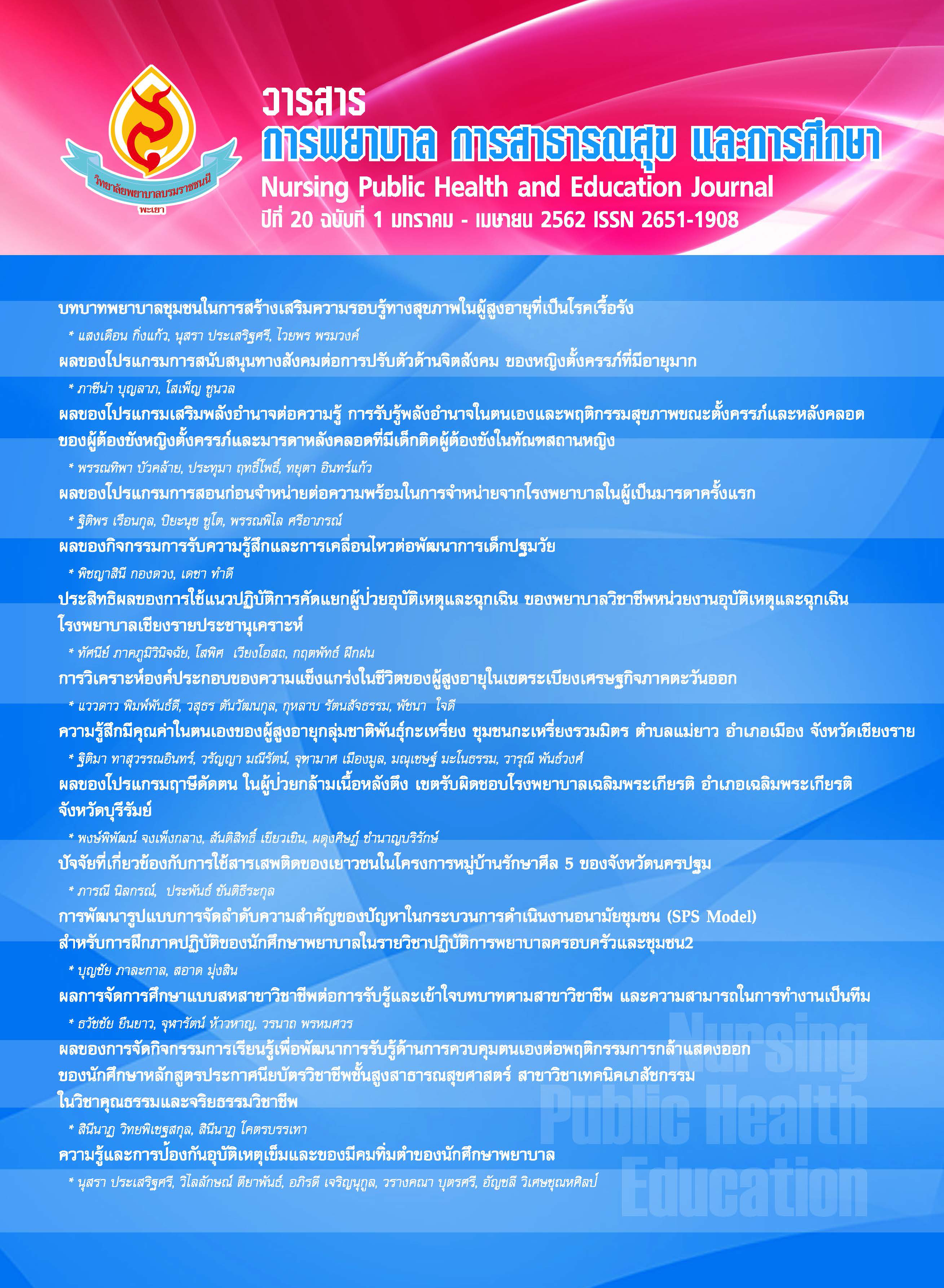การวิเคราะห์องค์ประกอบของความแข็งแกร่งในชีวิตของผู้สูงอายุ ในเขตระเบียงเศรษฐกิจภาคตะวันออก
Keywords:
Factor Analysis, Resilience, Elderly, Eastern Economic Corridor, การวิเคราะห์องค์ประกอบ, ความแข็งแกร่งในชีวิต, ผู้สูงอายุ, ระเบียงเศรษฐกิจภาคตะวันออกAbstract
การวิจัยแบบภาคตัดขวางนี้ มีวัตถุประสงค์เพื่อวิเคราะห์องค์ประกอบของความแข็งแกร่งในชีวิตของผู้สูงอายุ ในเขตระเบียงเศรษฐกิจภาคตะวันออก ในระหว่างวันที่ 18 - 30 เมษายน 2561 กลุ่มตัวอย่างเป็นผู้สูงอายุ จำนวน 480 คน ใช้วิธีสุ่มตัวอย่างแบบหลายขั้นตอน เครื่องมือเป็นแบบสอบถามความแข็งแกร่งในชีวิตของผู้สูงอายุ ซึ่งผ่านการตรวจสอบคุณภาพโดยการหาดัชนีความตรงตามเนื้อหา มีค่า CVI รวมทั้งฉบับเท่ากับ 0.90 รายมิติอยู่ระหว่าง 0.80 - 0.97 และความเชื่อมั่นของเครื่องมือทั้งฉบับเท่ากับ 0.939 รายมิติอยู่ระหว่าง 0.704 - 0.916 วิเคราะห์ข้อมูลด้วยการวิเคราะห์องค์ประกอบเชิงสำรวจ โดยการสกัดองค์ประกอบหลัก หมุนแกนองค์ประกอบแบบออโธโกนอลด้วยวิธีแวริแมกซ์ ผลการวิจัยพบว่า ความแข็งแกร่งในชีวิตของผู้สูงอายุ มี 6 องค์ประกอบ 42 ตัวแปร ดังนี้ องค์ประกอบที่ 1) ความสามารถในการจัดการอารมณ์และเห็นคุณค่าตนเอง2) ความสามารถทางด้านสังคม3) ความมั่นคงในการปฏิบัติทางจิตวิญญาณ4) ความสามารถในการจัดการปัญหาชีวิตเชิงบวก 5) การรับรู้ความสามารถและจุดมุ่งหมายในชีวิตและ 6) การดูแลสุขภาพกาย มีตัวแปรที่บรรยายองค์ประกอบ จำนวน 11, 8, 4, 8,7 และ 4 ตัวแปร ตามลำดับเมื่อวิเคราะห์เป็นรายองค์ประกอบ พบว่า ความแข็งแกร่งในชีวิตของผู้สูงอายุอยู่ในระดับสูงด้านความมั่นคงในการปฏิบัติทางจิตวิญญาณระดับปานกลางด้านความสามารถในการจัดการอารมณ์และเห็นคุณค่าตนเองความสามารถในการจัดการปัญหาในชีวิตเชิงบวก การรับรู้ความสามารถและจุดมุ่งหมายในชีวิต และระดับต่ำด้านความสามารถทางด้านสังคม และการดูแลสุขภาพกาย
The Factor Analysis of Elderly Resilience in Eastern Economic Corridor
This cross sectional study was aimed at analyzing the components of elderly resilience in Eastern Economic Corridor between 18-30 April 2018. The samples were 480 elderly people selected by Multi-stage random sampling. Data were collected by using elderly resilience questionnaire. The quality of the tool was verified by CVI that content validity for scale was 0.90, dimension content validity indexes were between 0.80 - 0.97, the reliability overall of Cronbach’s alpha coefficient was 0.939, and dimension reliability were between 0.704 - 0.916. An exploratory factor analysis was carried out by using the methodology for the exploratory factor analysis with the principal component analysis as well as the orthogonal rotation with varimax rotation method. Results revealed that the elderly resilience of 6 factors with 42variables were 1) Emotional regulation and self-esteem competence, 2) Social competence, 3) Spiritual practice security, 4) Positive coping competence, 5) Self-efficacy and sense of purpose, and 6) Physical health caring which were identified by 11, 8, 4, 8, 7,and 4 variables respectively. Additionally, when each component was analyzed, it found that the elderly resilience was the high level in spiritual practice security component, the moderate level in emotional regulation and self-esteem competence, positive coping competence, self-efficacy and sense of purpose, low level in social competence, and physical health caring.
References
กรมสุขภาพจิต. (2555). การเสริมสร้างพลังสุขภาพจิตสำหรับสื่อมวลชนท้องถิ่น. กรุงเทพฯ: สานคิด.
ฉัตรฤดี ภาระญาติ. (2558). ปัจจัยทำนายพลังสุขภาพจิตของผู้สูงอายุ. วารสารคณะพยาบาลศาสตร์ มหาวิทยาลัยบูรพา, 24(2), 97-106.
มูลนิธิสถาบันวิจัยและพัฒนาผู้สูงอายุไทย. (2559). รายงานสถานการณ์ผู้สูงอายุไทย. กรุงเทพฯ: อมรินทร์พริ้นติ้งแอนด์พับลิชชิ่ง.
วิไลวรรณ ทองเจริญ. (2554). ศาสตร์และศิลป์การพยาบาลผู้สูงอายุ. กรุงเทพฯ: โครงการตำราคณะพยาบาลศาสตร์ มหาวิทยาลัยมหิดล.
สำนักงานคณะกรรมการพัฒนาการเศรษฐกิจและสังคมแห่งชาติ. (2559). แผนงานพัฒนาระเบียงเศรษฐกิจภาคตะวันออก (พ.ศ. 2560-2564). มติคณะรัฐมนตรีเมื่อวันที่ 28 มิถุนายน 2559.
สำนักส่งเสริมและพัฒนาสุขภาพจิต กรมสุขภาพจิต. (2560). คู่มือวิทยากรจัดกิจกรรมสร้างสุข 5 มิติ สำหรับผู้สูงอายุในชุมชน. กรุงเทพฯ: โรงพิมพ์สำนักงานพระพุทธศาสนาแห่งชาติ.
American Psychological Association. (2014). The road to resilience: What is resilience?. Retrieved May 31, 2015 from https://www.apa.org/helpcenter/road-resilience.aspx.
Arlete, P. F., & Anita, L. N. (2015). Resilience in ageing: literature review. Cienc. Saude coletiva, 20(5).
Bennett, K. M. (2010). How to achieve resilience as an older widower: turning points or gradual change?. Ageing and Society, 30(3), 369-382.
Centre for Policy on Ageing. (2014). Resilience in Older Age. Retrieved August 12, 2018 from https://www.cpa.org.uk/information/reviews/CPA-Rapid-Review-Resilience-and- recovery.pdf.
Cheung, C., & Kam, P. (2012). Resiliency in older Hong Kong Chinese: using the grounded theory approach to reveal social and spiritual conditions. Journal of Ageing Studies, 26, 355-367.
Erica, S. E., & John, H. (2015). Resilience in Ageing. Arizona Center on Ageing. The University of Arizona.
Gooding P. A., Hurst A., Johnson J., & Tarrier, N. (2012). Psychological resilience in young and older adults, International Journal of Geriatric Psychiatry, 27(3), 262-270.
Hair, J. F., Black, W. C., Babin, B. J., & Anderson, R. E. (2010). Multivariate data analysis: A global perspective (7th ed.). New Jersey: Pearson Education Inc.
Herrick, A. L., Lim, S. H., Wei, C., Smith, H., Guadamuz, T. E., Friedman, M. S., & Stall, R. (2011). Resilience as an untapped resource in behavioral intervention design for gay men. AIDS and Behavior, 15, S25-S29.
Hildon, Z., Montgomery, S. M., Blane, D., Wiggins, R. D., & Netuveli. (2010). Examining Resilience of Quality of Life in the Face of Health-Related and Psychosocial Adversity at Older Ages: What is “Right” About the Way We Age?, The Gerontologist, 50(1), 36-47.
Kent, M., & Davis, M. C. (2010). The emergence of capacity-building programs and models of resilience. In J. W. Reich, A. J. Zautra, & J. S. Hall (Eds.). Handbook of adult resilience (pp. 427-449). New York, NY: the Guilford Press.
Resnick, B. A., & Inguito, P. L. (2011). The Resilience Scale: Psychometric Properties and Clinical Applicability in Older Adults. Archives of psychiatric nursing, 25(1), 11-20.
Sonthaya, M., Isaramalai, S., & Boonyasopun, U. (2011). A conceptual structure of resilience among Thai elderly. International Journal of Behavioral Science, 6(1), 24-40.
Vahia, I. V., Depp, C. A., Palmer, B. W., Fellows, I., Golshan, S., Thompson, W., Allison, M., & Jeste, D. V. (2011). Correlates of spirituality in older women. Aging & mental health, 15(1), 97-102.
Wagnild, G., & Young, H. (1993). Development and psychometric evaluation of the resiliency scale. Journal of Nursing Measurement, 1, 165-178.
Walsh, F. (2012). Successful Aging and Family Resilience In Haslip B and Smith G (eds) Emerging Perspectives on Resilience in Adulthood and Later Life. Annual review of gerontology & geriatrics, 32, 153-172.
Wells, M. (2009). Resilience in Rural Community-Dwelling Older Adults. The journal of rural health, 25(4), 415-419.
Wiles, J. L., Wild, K., Kerse, N., & Allen, R. E. S. (2012). Resilience from the point of view of older people: There still life beyond a funny knee'. Social science & medicine, 74(3), 416-424.


